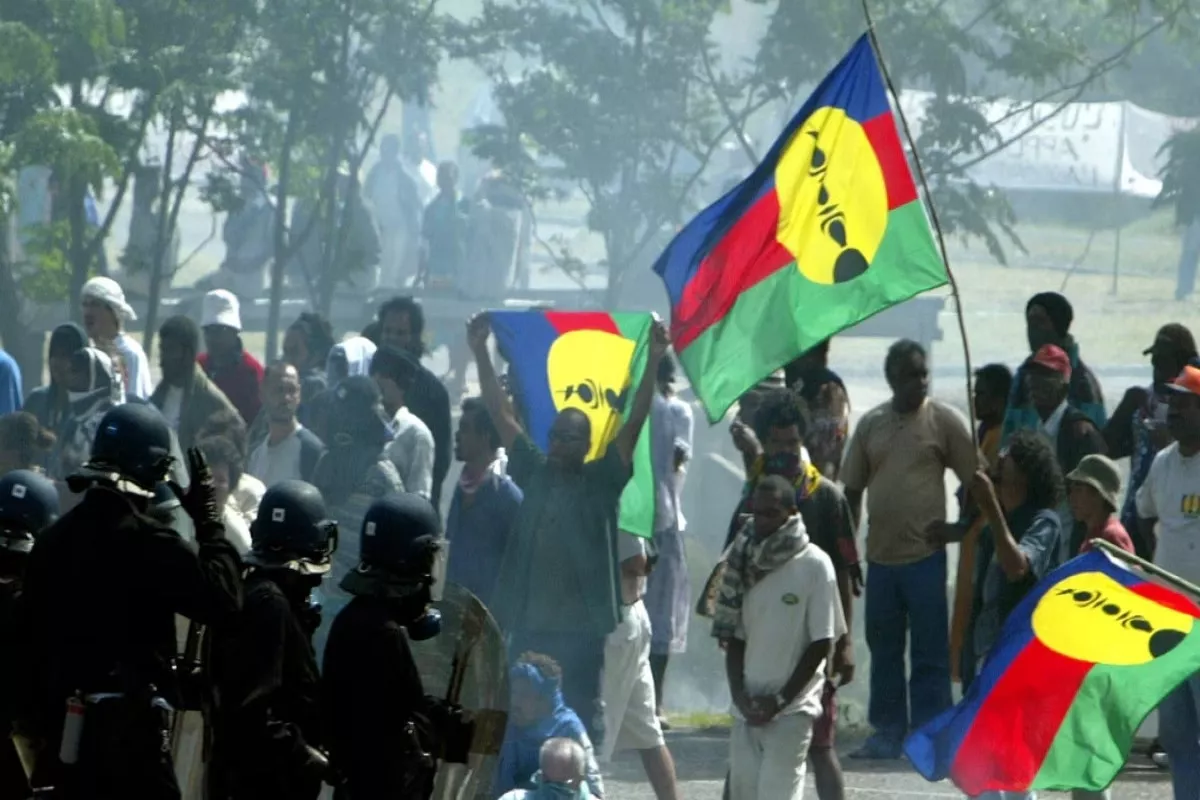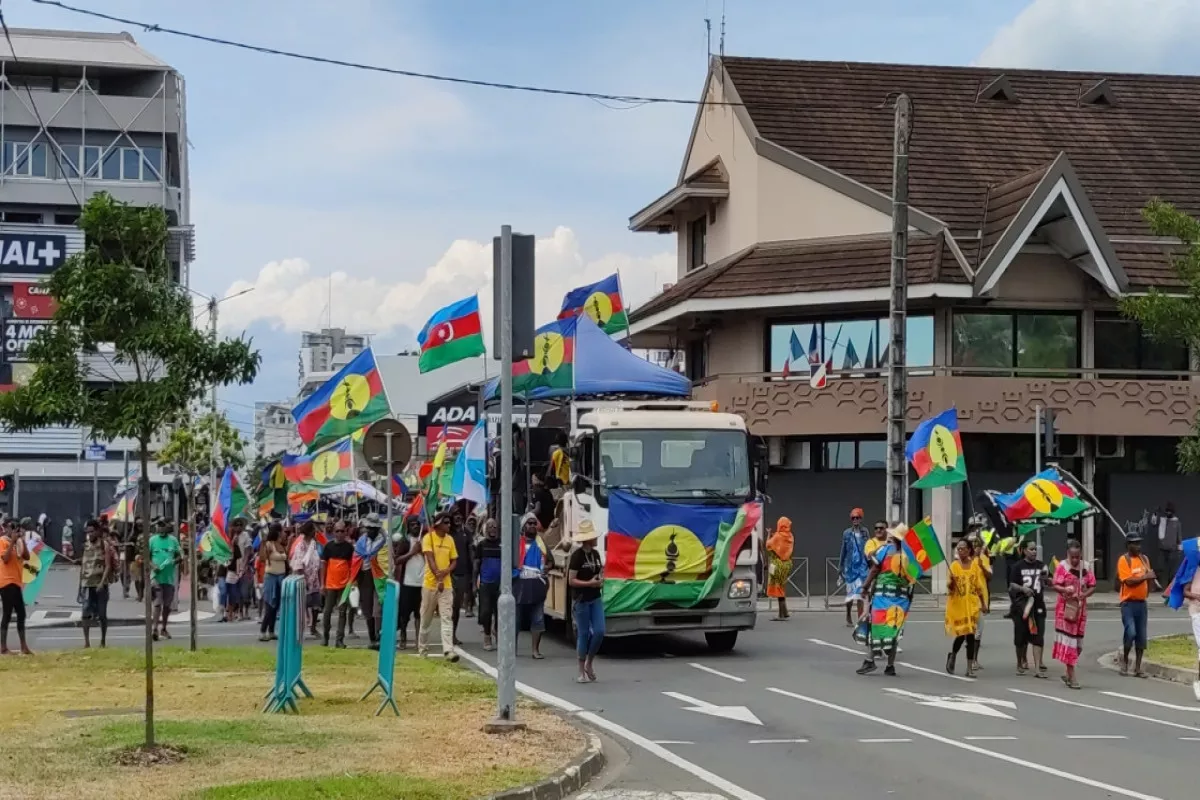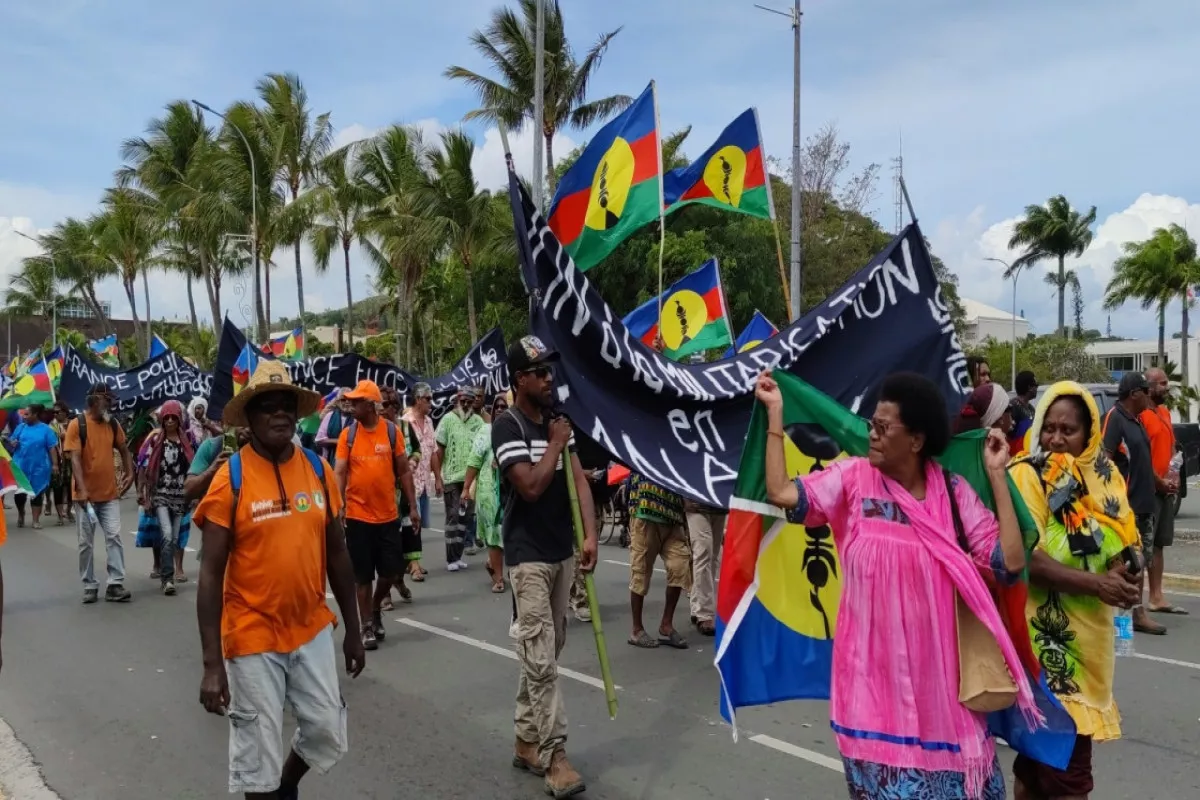Defying Macron: Kanaks’ unyielding quest for independence Decolonization as lifeline
In New Caledonia, four months have passed since the implementation of emergency security measures in this French overseas territory, yet peace and stability remain elusive. Many island residents believe that only full decolonization can pave the way out of this ongoing crisis.
A day of mourning or celebration?
September 24 marks Citizenship Day in New Caledonia, a day that evokes mixed feelings. This date commemorates the start of Napoleon III’s military conquest of the archipelago 171 years ago, a campaign that brutally suppressed indigenous resistance. While the day has traditionally been observed as a Kanak Day of Mourning, it has officially been recognized since 2004 as a "Day of Citizenship and Unity." The day before the celebrations, tensions rose as the island braced for potential protests, leading authorities to tighten police measures. Gendarmerie Commander Nicholas Matteos remarked, "The 24th could have been irresponsibly declared the date of the uprising. We must reassure the population and dissuade the few radicals who might be tempted to commit abuses."
To maintain order, a curfew was imposed from 6 PM to 6 AM, alcohol sales were prohibited, and around 6,000 law enforcement personnel were deployed. Mobile gendarmerie units and police special forces were on high alert, utilizing armoured vehicles at checkpoints and employing bomb disposal teams to clear debris and barricades. Many shop owners chose to close their businesses, and residents prepared by stockpiling food supplies.
The French government and local authorities were particularly concerned about rumours suggesting that an act of independence might be declared on September 24. This notion had been circulating for some time, and at a meeting on June 8, Daniel Goa, the leader of the Union Calédonienne (UC), had called for a declaration of full and unconditional sovereignty for New Caledonia. Although the planned declaration was initially set for September 24, it was later postponed for a year. The Calédonian Union, once seen as a moderate group aligned with the French Socialist Party advocating for greater autonomy, has now shifted its stance, placing the blame for the ongoing colonial conflict squarely on President Macron and his government.

Hippolyte Sinevami-Htamumu, a former senator and President of the National Council of Great Chiefdoms, has recently taken the initiative to declare sovereignty by proposing a ceremony to proclaim "the sovereignty of the chiefdoms over their traditional territories" on the current Day of Citizenship in the Marais. On July 30, Sinevami-Htamumu exited the local traditional Senate in protest against the colonial policies of the French State.
Tensions escalated sharply in the lead-up to Citizenship Day. On the evening of September 19, police shot and killed two local men in the Saint-Louis tribe of Mont-Dore. One victim was 29 years old, while the other was 30. According to the official account, a group of 3-5 masked men opened fire on mobile gendarmes, prompting the police to return fire. Eyewitnesses reported that the shooting persisted throughout the night, with one victim succumbing to his injuries en route to the hospital, and the other dying at the scene.
Following the first death, outrage erupted among local residents. French security forces established two roadblocks, effectively creating a blockade that affected members of the Saint-Louis tribe both inside and outside the territory.
In response to the killings, community members began blocking roads and setting tyres ablaze. After news of the second police-related death, the Kanak Coordinated Field Action Teams (CCAT) announced the closure of the Faust-Yate road, allowing only ambulances, emergency services, and other priority vehicles to pass. Meanwhile, the Socialist Front for the National Liberation of Kanaks (FLNKS) held a press conference where spokespersons Dominic Foki and Alosio Saco condemned the "barbaric and humiliating methods" employed by the police, as well as the "disproportionate use of force."
What is happening again in New Caledonia? Despite French President Macron dispatching additional security forces and assuring a political resolution to the crisis, tensions remain high.
Romantics from the RP1 motorway
In April and May of this year, legislation was reactivated, allowing newcomers with a short residence in New Caledonia to participate in elections. Kanak activists perceived this as yet another step toward the creeping colonization of the island. They believed that allowing newcomers from other regions to vote could enable the French authorities to exploit them as colonists. This led to widespread protests in New Caledonia, which the French government attempted to quell through the police force. Thousands of protesters were arrested, with many becoming more radicalized upon their release.
In particular, young men from the Saint-Louis tribe began targeting police and vehicles along the RP1 motorway that runs through their territory. Despite attempts by St. Louis chief and former New Caledonia Congress president Roch Wamitan, along with other traditional leaders, to rein in these groups, their efforts have largely failed. The traumatic experience of detention has fueled a belief among these youths that violent action is their only recourse. While no gendarmes have been killed in these attacks, the same cannot be said for the activists. Meanwhile, moderate leaders within the Kanak movement now advocate for a negotiated solution, but the youth's radical actions hinder these efforts.

The residents of Mont-Dore are seeking a legal resolution by recently forming an association to file a complaint against the blockade of the RP1 motorway by French security forces, citing the material and psychological toll of the roadblocks. However, their efforts have yet to yield results.
Protests in New Caledonia continued throughout the past weekend, with barricades erected in the streets of Greater Nouméa, where police faced stone-throwing from demonstrators. Protesters also occupied the Nouméa roundabout. On the night of September 23, French security forces made 15 arrests, bringing the total number of arrests during the protests to 2,930.
In addition to these clashes, local women have reported escalating issues following the deployment of additional French police to the islands. Notably, on August 30, a 22-year-old woman was detained and raped by security forces while returning home after curfew. The FLNKS has since filed a lawsuit regarding this incident. Various women's associations in New Caledonia have also raised concerns about abusive behaviour towards Indigenous women by military personnel sent from the mainland.
These harsh measures and reported abuses only serve to deepen the alienation of this "overseas territory" from its French metropolis.
Premonition of civil war
In the wake of the tragic deaths of two young men from Saint Louis on September 19, the death toll during the current unrest in New Caledonia has now reached 13. The archipelago has not seen such a surge of violence since the 1980s, a period marked by a brutal civil war. The question looms: could history be repeating itself?
Amidst the escalating confrontation on the island, there exists not only the police and independence supporters but also a third faction—the Collective of Civil Resistance (CRC). Originating at the outset of the unrest in Paita, these self-defence units, also known as "Vigilant Neighbours," have taken it upon themselves to barricade their neighbourhoods, maintain a constant watch at checkpoints, and prevent both pro-independence supporters and criminal elements from infiltrating their areas.
Willy Gatuhau, the former mayor of Paita and leader of the movement, asserts that the CRC is not militia-like in nature. However, witnesses have reported seeing CRC members armed and wearing uniforms and balaclava masks. Notably, Gatuhau himself participated in the civil conflict of the 1980s at just 15 years old, though it remains unclear which side he supported.
Concerningly, among the 13 fatalities recorded during the unrest, four were reportedly killed by "civilians," likely loyalist fighters or members of these self-defence groups. The CRC's loyalist tendencies are further highlighted by their call for members to display French national flags on balconies and vehicles on September 24 and to sing the national anthem at noon. Sadly, the spectre of a new civil war may be closer than it appears.
The main goal is full sovereignty
In early September, the 43rd Congress of the Socialist Front for the National Liberation of the Kanaks (FLNKS) convened, marking a significant moment in the ongoing struggle for autonomy in New Caledonia. During the congress, Kristan Keith, the leader of the Coordination of Field Action Teams (CCAT) currently imprisoned in a French facility in Alsace, was elected president of the Front. The event also saw participation from the Front's affiliated groups, including the Kanak Union (UC) and the Democratic Rally of Oceania (RDO). Notably absent were historical members like the Palika (Party for the Liberation of the Kanaks) and the Progressive Union of Melanesia, likely due to their more moderate stances.

Palika issued a statement expressing regret that the congress did not prioritize discussions aimed at resolving the crisis and re-establishing dialogue with the authorities. Similarly, the Melanesian Progressive Alliance lamented that the Congress failed to unanimously condemn the recent unrest. In response, the RDO argued that a resolution would first require the lifting of roadblocks imposed by the authorities, emphasizing that peace would come with the restoration of freedom of movement.
The congress reaffirmed the FLNKS's commitment to achieving full sovereignty for New Caledonia. It also addressed social issues, economic reconstruction, and youth policy in dedicated sessions. Laurie Khumuni, the secretary general of the RDO, described the events of May not as riots, but as a "political and social revolt." He highlighted that social factors significantly contribute to the protests, noting that the cost of living in New Caledonia is up to 70% higher than in mainland France, while wages are 20% lower.
"The young people who spoke out expressed a cry of anguish because they have always been left on the sidelines," Khumuni stated.
It is noteworthy that the FLNKS was founded on the Kanak Day of Mourning, 40 years ago on September 24, 1984, marking the historical significance of this date in the ongoing quest for sovereignty.
Independence as the only alternative
In contrast to the growing calls for independence, there are simultaneous efforts to solidify extreme tendencies within the political landscape. While left-wing parties in France generally lean towards supporting decolonization in overseas territories, representatives from the Unconquered France movement have openly expressed their solidarity with the Kanak population, the vast majority of whom advocate for independence. However, French President Emmanuel Macron, disregarding the outcome of the recent elections in which the left-wing New Popular Front emerged victorious, appointed a government dominated by liberal Macronists and right-wing conservatives.
François-Noël Buffet, known for his hardline stance on migration, has taken on the role of Minister of Overseas Territories. Buffet's support for a controversial electoral law in New Caledonia, which has fueled the ongoing unrest, further complicates the situation. The resolution of the crisis hinges on whether this law, allowing recent migrants to vote, will be enacted. Elections in New Caledonia, originally scheduled for May but postponed due to unrest, are now set to take place by December 15. Moderate Kanak politicians, however, remain hopeful for dialogue with the new minister.

Many view the new Minister of the Interior, Bruno Riteilot from the Republican party, as leaning towards extreme right perspectives on several issues. In a September 2023 interview, he nostalgically referred to the "beautiful hours" of French colonization. Meanwhile, independence advocates are pinning their hopes on support from countries in the Global South, which are experiencing a renewed sense of unity. Daniel Goa, leader of the Caledonian Union, indicated that around fifty countries are ready to recognize and support their cause internationally. Ongoing consultations are taking place with the BRICS group and the Non-Aligned Movement.
Protests in New Caledonia persisted through the night of September 23-24. The Puma gendarmerie brigade in Nouméa came under attack, and despite a ban on gatherings, several demonstrations were held to commemorate the Kanak People's Day of Mourning. A rally took place in Mont Dore in solidarity with the Saint Louis tribe, while in Lifou, approximately 300 individuals gathered to celebrate the 40th anniversary of the FLNKS and the 171 years of colonization. In Thio, the Field Coordination Groups organized a demonstration in memory of an activist killed by gendarmes on August 15. Thankfully, the current Citizenship Day in New Caledonia is proceeding with minimal unrest or casualties.
Additionally, the Inaat-ne-Kanaka National Council of Great Chiefs fulfilled its promise by gathering in the La Roche district on the island of Marais to proclaim the sovereignty of the chiefdoms over their traditional territories. This declaration is not merely symbolic; it calls for "the establishment of autonomy in managing Kanak identity affairs, with the support of the indigenous Kanak people for their development and emancipation over the course of a generation." Representatives from other regions of Oceania, including Fiji, Vanuatu, and the Maori people, attended the meeting. It is evident that, despite the French State's efforts to quell dissent, the Kanak people's aspirations for independence remain resolute and unstoppable.








